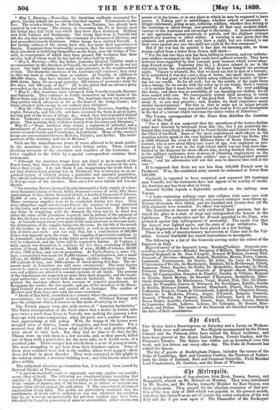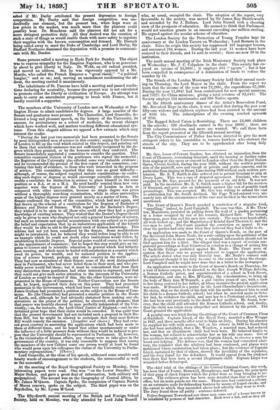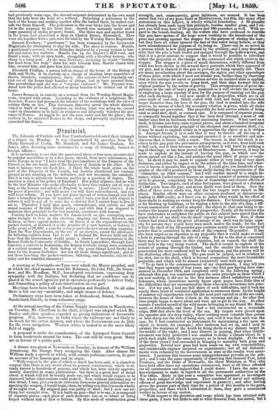S4r 3littrupulio.
A strong deputation of hop-planters from Kent, Sussex, Surrey, and Hampshire, waited on Mr. Disraeli on Monday. They were introduced by Mr. Deedes, and Mr. Darby, formerly Member for East Sussex, was their spokesman. They prayed for the absolute remission of that por- tion of the hop duty of 1858 which was payable in the present month, and they also claimed as an act of justice the entire reduction of the war duty and the 6 per cent upon it. The Chancellor of the Exchequer
asked if Mr. Darby attributed the present depression to foreign competition. Mr. Darby said that foreign competition was un- doubtedly one element, but the present tax, when hops were at low prices in the market, was much more than the planters could possibly bear. Dr. Monckton said the planters did not ask for a more stringent protective duty. All they desired was the creation of such a state of things as would enable them with more safety to regulate their supplies with the known consumption and demand. Mr. Disraeli b'u called away to meet the Duke of Cambridge and Lord Derby, Sir Stafford Northcote dismissed the deputation with a promise to communi- cate with Mr. Deedes.
Some persons called a meeting in Hyde Park for Sunday. The object was to express sympathy for the Emperor Napoleon, who is so generous- ly about to give liberty to Italy. Dr. Webb, an old radical presided, and moved an address. But he was vigorously opposed by a Mr. Mantle, who called the French Emperor a "great rimed," " a political burgla;," and so on; and, moving an amendment condemning the ad- dress, the meeting carried it unanimously.
The inhabitants of St. Pancras have held a meeting and passed resolu- tions declaring for neutrality, because the present war is not calculated to promote either the liberty or civilization of Europe. An attempt was made to carry an amendment proposing to break with France, but it hardly received a supporter.
The members of the University of London met on Wednesday at Bur- lington House to admit candidates for degrees. A large number of the Senate and graduates were present. The Chancellor, Lord Granville, de- livered a long and pleasant speech, on the history Of the University, its success, its pre6minence as a school of medicine, the recent changes which have worked well, and matters touching different educational sys- tems. From this elegant address we append a few extracts which may interest the reader.
"During the last year two memorials had been presented to the Senate by most distinguished men of science in this country, urging the University of London to fill up the void which existed in this respect, and pointing out to them that scientific eminence was not sufficiently recognized by the de- grees which they granted, or by the honours which they conferred. The Senate immediately appointed a committee to consider the question. That committee examined sixteen of the gentlemen who signed the memorial ; the Registrar of the University also afforded some very valuable evidence ; and he recommended the perusal of the first report of the committee, con- taining this body of evidence, to those who were interested in the progress of science. The committee reported that they saw no great difficulty— although, of course, the subject required mature consideration—in confer- ring such degree or degrees as would encourage scientific education, and enable a candidate for distinction in science to place himself in the same position as a B.A. or as a MA He need hardly remind them how very superior were the degrees of the University of London in Arts as compared with other universities, because no single degree was given without a thoroughly searching examination, while in other universities some of the higher degrees were granted merely as a matter of form. The Senate confirmed the report of the committee, which had met again, and had drawn up the scheme of a curriculum for the Degrees of Bachelor of Science and Doctor of Science. With regard to the Bachelor's Degree, they wished it to be open to all those who could show they had a general knowledge of existing science. They wished that the Doctor's Degree should only be given to men who displayed not only a general knowledge of science, but such an intimate and special acquaintance with one subject as to justify the belief and expectation that by an industrious application of the talents they would be able to add to the general stock of human knowledge. This scheme had not yet been considered by the Senate. Some modifications might be introduced, but he believed they would before long be able to set an example which he could not doubt other institutions would follow, by establishing Scientific Degrees_ Especial pains would of course be necessary in the appointment of examiners ; but he hoped this step would give an im- petus to science and to scientific education m general which had hitherto been wanting, and which must be hailed with satisfaction in a country which owed its power its wealth and its national position to the applica- tion of science 'beyond, perhaps, any other country in the world They had now as members of their Senate some of the most distinguished men in Parliament, who had never failed them in their need, and who pro- bably never would fail them ; but it must be remembered that from their very distinction these gentlemen had other interests to represent, and that they could not give such entire attention to the interests of the University of London as would be insured if this, like the other Universities, were re- presented in the House of Commons. Neither Convocation nor the Senate had, he hoped, neglected their duty on this point. They had presented memorials to the Government, which had been very cordially received. Sir James Graham had presented a petition on the subject in the House of Com- mons. He (the Chancellor) had presented a similar petition in the House of Lords, and, although he had advisedly abstained from making any ob- servations on the prayer of the petition, he observed, with pleasure, that that prayer was heartily cheered by menperfectly independent of the Uni- versity,—as, for instance, the Lord Chief Justice of England,—and he en- tertained great hope that their claim would be conceded. It was quite true that the present Government had not included such a proposal in their Re- form Bill, but he might be allowed to anticipate that their next Reform Bill would remedy the omission. (Laughter and cheers.) They had evin- ced great courtesy in answering the applications which had been made to them at different times, and he hoped that either spontaneously or under the influence of a little pressure from without they would be induced to pro- pose that the University should be represented in Parliament. If, however, in the vicissitudes of human affairs, any change were to take place in the government of the country, it was only reasonable to suppose that among the members of the new Cabinet some one person would at least be found who would press upon his colleagues the claims of the University to Parlia- mentary representation." (Cheers.) Lord Granville, at the close of his speech, addressed some sensible and hearty words of encouragement to the students, the unsuccessful as well as the saccessfuL
At the meeting of the Royal Geographical Society on Monday, three interesting papers were read. One was " on the Lower Danube," by Major Stokes, and gave a great deal of information, both military and geographical. The second was on the Geography of Central Africa, by Mr. James M'Queen. Captain Speke, the companion of Captain Burton of Mecca renown, spoke on the subject. The third paper was on the Seychelles, by Mr. Lyons M'Leod.
The fifty-fourth annual meeting of the British and Foreign School Society, held on Monday, was duly attended by Lord John Russell
who, as usual, occupied the chair. The adoption of the report, very favourable to the society, was moved by Sir James Kay Shuttleworth and seconded by Sir J. Boileau. Lord John Roviell took a cheering view of the prospects of education. He seemed to think that Parliament would not sanction grants to an amount exceeding one million sterling. He argued against the secular scheme of education.
The London Society for the Protection of Young Females kept its anniversary at the London Tavern on Wednesday; Lord Berners in the chair. Since its origin this society has suppressed 497 improper houses, and succoured 784 women. During the last year 11 women have been restored to their friends, and 14 sent to service ; there are now 59 in the institution.
The tenth annual meeting of the Irish Missionary Society took place on Wednesday ; Mr. J. C. Colquhon in the chair. This society has en- joyed an income of 25,9801.; it employs 592 " agents " ; but it has been compelled in consequence of a diminution of funds to reduce the number by 18.
The friends of the London Missionary Society held their annual meet- ing on Thursday, the Lord Mayor in the chair. From the report we learn that the income of the year was 73,2881., the expenditure 67,3031. During the year 11,0841. had been contributed for new special missions, and 75271. for China missions; giving a total revenue of 92,6411. The Society employs 164 missionaries and 600 Native agents.
At the fiftieth anniversary dinner of the Artist's Benevolent Fund, Mr. Bereaford Hope in the chair, it was stated that during the past year fifty-one widows and eighteen orphans had been assisted to the amount of 818/. 158. The subscriptions of the evening reached upwards of 3741.
The Ragged School Union is flourishing. There are 23,000 children in the schools ; 326 shoeblacks earned in the year 40001. ; there are 2700 voluntary teachers, and more are wantea. We cull these facts from the report presented at the fifteenth annual meeting.
The City Commissioner of Police has been directed to give the most stringent orders to his constables to remove hawkers who obstruct the streets of the city. They are to be apprehended after being duly warned.
Mr. Gye, lessee of Covent Garden, has obtained an injunction from the Court of Chancery, restraining Graziani, until the hearing or further order from singing at any opera or concert in London other than the Royal Italian Opera, Covent Garden, during the year 1859, without the written permis- sion of the plaintiff, save and except at private and gratis concerts, and in particular from singing at DrurELane during 18.59 without such written per- mission. Mr. E. T. Smith is also ordered not to permit Graziani to sing at Drury Lane, This was a case of disputed agreement. Graziani, who was engaged by Mr. Gye, pressed for the payment of an old debt. It was not paid. In the meantime Mr. E. T. Smith made a higher bid for the services of Graziani, and gave also an indemnity against the cost of possible legal proceedings. This was accepted. Mr. Gye was willing to submit the case to arbitration but Mr. Smith declined. Sir Page Wood entered very ini- nutely into all the circumstances of the case and decided in the terms above mentioned.
The Court of Queen's Bench quashed a conviction of a singular kind, "appalling," indeed, to Lord Campbell. The case was this. A Mr. Thex- ton, Magistrate, persisted in pulling down the wall of a garden pertaining to a house occupied by one of his tenanti3, Richard Batt. The tenant,, thereupon, gave him and his men into custody. The men were handcuffed; all were locked up ; and the Magistrates of Kendal fined Thexton.11. and the two men Is. each. The Court quashed the conviction on appeal. It was clear the parties had only done what they believed they had a right to do.
An application was made to the Court of Queen's Bench, on the part of the Reverend John Mason Neale, for a rule calling upon the publisher of the Brighton Gazette to show cause why a criminal information should not be filed against him for a libel. The alleged libel was a report of certain ma- gisterial proceedings at East Grinstead in relation to a charge of setting fire to Sackville College preferred against Mr. Neale. The Court were of opinion that there was no ground whatever to support the application. The article stated what was only literally true. Mr. Neale's counsel said the applicant thought it his duty to come to the court to deny the charge. Lord Campbell said he might have done that in a letter to the newspaper.
An application was made to the Court of Queen's Bench on Thursday, for a writ of habeas corpus, to be directed to the Rev. Joseph William Roberts, a Roman Catholic priest, and superintendent of a school in York Street, Westminster, and also to Mrs. M'Carthy, the schoolmistress, to bring up the body of Mary Ann M‘Donnell, a girl twelve years of age, with a view to her being restored to her father, at whose instance the present application was made. M'Donnell is a porter in the Lord Chamberlain's Department. He states, that on the death of his first wife his mother induced him to send his child to a Roman Catholic school ; but when he married again in Octo- ber last, he withdrew the child, and sent her to a Protestant school, where she had been sent previously to the death of her mother. He found, how- ever, that the child still attended the Roman Catholic school, and, finally, that the child was taken away altogether and detained by the priest. The Court granted the application.
A painful case was tried during the sittings of the Court of Common Pleas at Guildhall. Captain Lloyd, of the Royal Navy, married a Miss Wragge in 1847, and three months after went to India on duty. During his absence he supplied his wife with money, but on his return in 1850 he found that she had been unfaithful, that a Mr. Winslow, a married man, had seduced her, and that an illegitimate child had been born. He behaved kindly to the woman, but refused to acknowledge her as his wife any more. One of her creditors brought an action against Captain Lloyd, to recover a sum for board and lodging. The defence was, that the woman had committed adul- tery, the rejoinder that the adultery had been condoned, and places were mentioned where condonation had taken place ; but the evidence of Captain Lloyd, sustained by that of others, showed the invalidity of the rejoinder, and the Jury found for the defendant. It would appear from the evidence that there had been born a second illegitimate child. Captain Lloyd was wounded before Sebastopol.
The chief trial at the sittings of the Central Criminal Court, this week, has been that of Foster, Bramwell, Humphreys, and Wagner, the principals of that gang of check forgers which the police were so long bringing to ac- count. The evidence given has been more detailed than that at the police office, but its main points are the same. These men had contrived a scheme on an extensive scale for defrauding bankers by means of forged checks, and the extent to which they succeeded shows how adroitly they went to work. The Jury found them all guilty : sentence deferred. Police-Sergeant Townahend saw three men come out of a house known to be inhabited by persons of bad character. Each wore abet, and as they all had previously worn caps, the shrewd sergeant determined in his own mind that the hats were the fruit of a robbery. Detaching a policeman to the back of the house and sending another after the hatted three, he waited out- side the front himself. The policeman in the rear broke into the house and let in the sergeant by the front door. Search was instantly made and a large quantity of stolen property. found. The three men and another found in the house had plundered a shop in Church Street, Shoreditch. They were all, together with a girl, sent for trial by the Worship Street Magistrate.
Samuel Newbury, " gentleman" has been remanded by the Greenwich Magistrate for attempting to slay his wife. The story is curious. Mantle, a gentleman's servant, was on Saturday implored by a young woman to has- ten and rescue her mistress. Mantle ran up the Shooter's Hill road, and found a man, with an open knife, struggling with a bleeding woman, who clung to a lamp post. As the man Newbury, declaring he would "butcher her head from her body" drew his wife towards him, Mantle closed with him, secured him, and gave him into custody.
Elizabeth Phillips, a person left in charge of the house of the Bishop of Bath and Wells, is in custody on a charge of stealing large quantities of sheets, blankets, counterpane; linen. She appears to have regularly car- ried out of the house large bundles of things, and to have pawned them. One pawnbroker said she was a "regular customer." Mr. Paynter won- dered how the police had allowed so many bundles to be carried out of the house.
James Scenes is in custody on a remand from the Worship Street Magis- trate, charged with arson. According to the evidence of a neighbour, Mr. Bourdon, Scenes had prepared the interior of his workshops with the view of setting them on fire. This fortunate discovery saved the whole district, which is built of wood. Bourdon, on finding what was going on, caused water in abundance to be held in readiness and diligently watched the pre- mises of Scenes. At length he saw the man enter and fire the place ; then rushing in, he surprised Scenes in the shops, and promptly applying water quenched the flames.




























 Previous page
Previous page